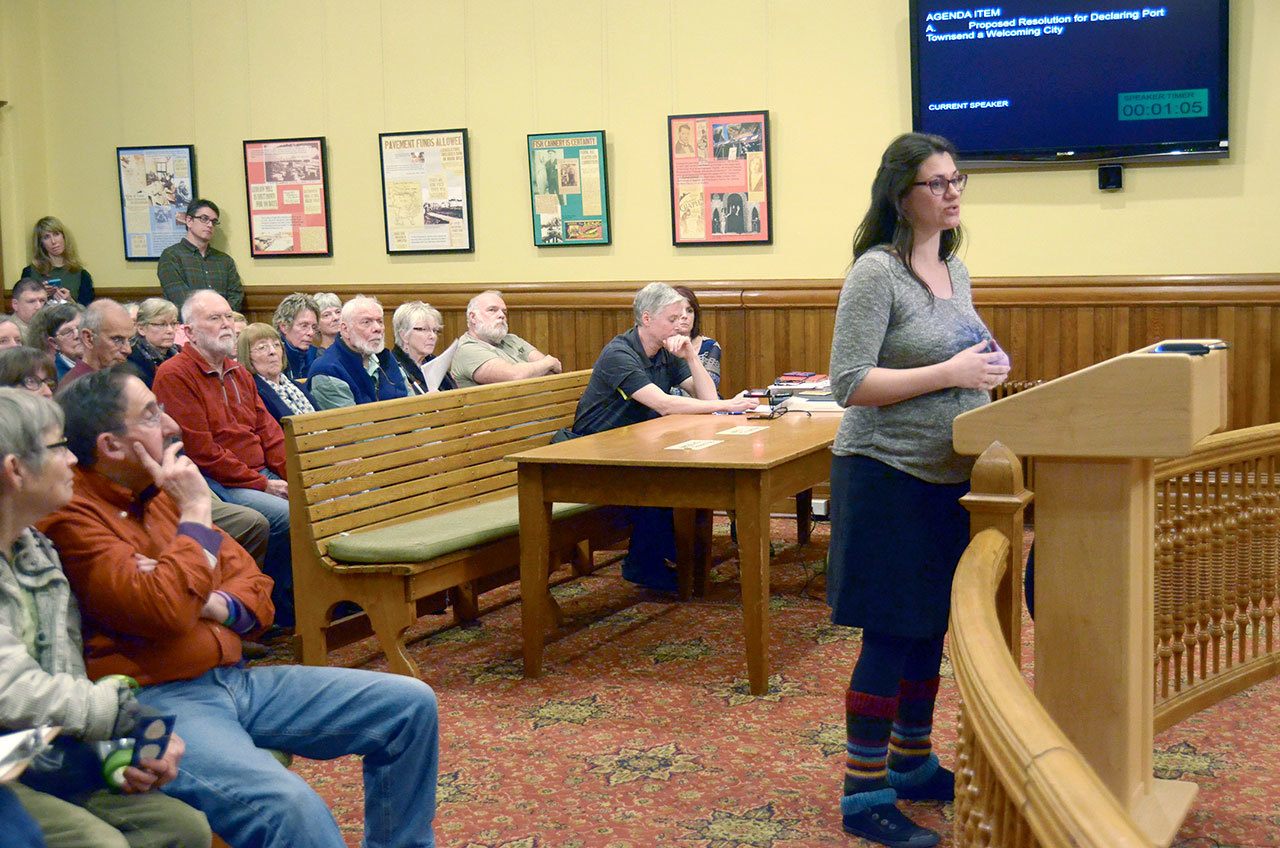PORT TOWNSEND — A three-member City Council subcommittee will draft a new resolution that would, if approved, declare Port Townsend a sanctuary city.
The draft resolution prepared by council members David Faber, Michelle Sandoval and Amy Howard is expected to be presented during a special meeting Feb. 27.
The decision was made Monday night after more than 90 people attended a council meeting to discuss if the city should become the first sanctuary jurisdiction on the North Olympic Peninsula. Some spoke against the idea; most spoke in favor of it and felt that a proposed draft resolution already presented didn’t go far enough.
“If we do this we are, in a sense, supporting other cities in our state as well as the 600 jurisdictions around the country,” said Florence Caplow, a minister at the Quimper Unitarian Universalist Fellowship, and one of nearly 20 community members who spoke Monday.
“We’re sending a strong message of support.”
Others felt the declaration of Port Townsend as a sanctuary city would bring in an influx of undocumented immigrants, crime and potential culture clashes.
“They’re here illegally and don’t belong here,” Brody Turner said. “I don’t want these people to come to this city and think they’re safe here. I don’t want you folks to make my city a place that I have to worry if they [immigrants] have criminal intent.”
Earlier in the meeting Annie Benson, an immigration attorney who drafted Seattle’s Welcoming City resolution approved in December, tried to ease such fears.
“There is no data, particularly from the federal government, that immigrants or immigrant communities commit more crime,” Benson said.
“What studies actually show is there is actually lower crime in these jurisdictions that have declared themselves sanctuary jurisdictions.”
No decision was made at Monday’s 2½-hour council meeting, which consisted mostly of public comment from the standing-room only crowd.
A primary concern was the potential loss of federal funding.
President Donald Trump signed an executive order Jan. 25 that threatens sanctuary jurisdictions with loss of federal funds. Sanctuary jurisdictions are cities, counties and state agencies that don’t comply with 8 U.S.C. 1373, which states that “a local government entity … may not prohibit, or in any way restrict, any government entity or official from sending to, or receiving from, the Immigration and Naturalization Service information regarding the citizenship or immigration status, lawful or unlawful, of any individual.”
Port Townsend received an estimated $11 million in federal funds in 2016, city officials said. The city uses the majority of its federal funding for law enforcement, highways, hazard negation projects and environmental protections, City Manager David Timmons said.
As Councilman Robert Gray said after public comment closed: “We just have to remember the people we want to help get those federal funds, too.”
Benson also said that sanctuary cities tend to have higher incomes per capita and lower unemployment rates than others.
“This is not my opinion or the opinion of the left,” Benson said. “These are studies done on the government’s own data.”
Turner expressed his hope that the Port Townsend Police would arrest people if they were undocumented.
“They run them through their system,” Turner said. “They know when they’re here illegally.”
Port Townsend Police Chief Michael Evans said that current police protocol is that undocumented immigrants are not arrested simply because of their immigration status but only if they commit crimes.
Evans said that policies like this make cities safer since people are able to come to the police for help, regardless of their immigration status.
“We’re going to be doing business as we’ve done,” Evans said. “We absolutely do not want people out there who are at all unsure or uncomfortable going to their local police.”
Evans said that police are required to deal with warrants from the federal government, but added that, to date, the Port Townsend Police Department has never received a detainer from the Immigration and Customs Enforcement (ICE).
Sandoval, Howard and Faber were all strongly in favor of the resolution. Sandoval, who was the first to respond, teared up during her response.
“So just to be clear, these people are here,” Sandoval said. “They probably work with you or for you. They are contributing members of our community. They have jobs, families, children, dogs, cats. They see our doctors, they participate in schools and sports.
“They are us, aside from the paper that declares them better humans to some people.”
________
Jefferson County Editor/Reporter Cydney McFarland can be reached at 360-385-2335, ext. 55052, or at cmcfarland@peninsuladailynews.com.

